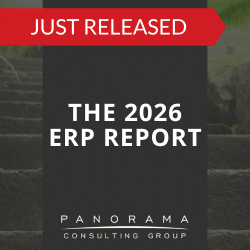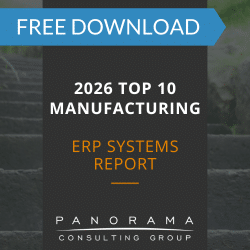Many ERP vendors are focusing on manufacturing sustainability as organizations become more conscious of not only saying they’re using sustainable resources but also proving it. In this podcast, we interview Colin Elkins, Vice President of Manufacturing Industries at IFS, to learn about the role of information technology in sustainable manufacturing. We’ll discuss how organizations can get on board and meet requirements before possible legislation.
Notable Excerpts from our Podcast
Samuel: What is the role of information technology in sustainable manufacturing?
Colin: I think it’s one of those topics that suddenly has come right to the forefront of manufacturing today. Within the ERP space, one of the things we’re recognizing is there’s legislation coming in.
There’s a responsibility now to customers and consumers in terms of proving sustainability. In the past, sustainability has been something that manufacturers have paid lip service to – they put it on their websites, they put it in their board papers. But now, consumers are starting to demand to see where the actual sustainability is coming from.
ERP software has an important role to play because it touches customers, suppliers and manufacturers and provides data that can prove sustainability.
Having a sustainable business is about making sure your supply of raw materials is sustainable and that you can sustain your marketplace with your customers.
Many of these customers are Millennials, and one study found that 75% of millennials say they’re actually willing to pay extra for sustainable products.
That said, using manufacturing ERP systems for things like labeling is becoming more important because it’s about proof now; not just checking a box on a website.
Sustainability also covers things like traceability and authenticity. It’s really about proving that what you’re doing is good for your customers, good for your suppliers, but also good for the planet.
For example, sustainability in manufacturing can mean looking at the processes you’re doing and asking: Are we using our power economically? Are we making products that can be recycled? Are we making the best of the materials we’re getting? Can we prove that what we’re doing will create a sustainable future, not only for our business but also for the planet?
Some of the big manufacturers are really taking this seriously. They are starting to see that sustainability is something that’s good for the balance sheet – it’s good for getting costs down; it’s good for public appeal; and it’s good for creating shareholder value.
Sustainability drives innovation, as well, because it means you start challenging how you manufacture a product. You start thinking about technology and how you can establish repeatable, scalable business processes.
2025 Top 10 Manufacturing ERP Systems Report
Are you a mid- to large-sized manufacturing firm? This report is for you. Download it now to learn what kind of advanced functionality is available in the market today.
Samuel: As one of the leaders in the manufacturing ERP space, how does IFS address manufacturing sustainability?
Colin: The great thing about ERP systems today is that they all have very similar top-level functional. However, the best ERP systems for sustainability are flexible enough that companies can maintain their competitive advantage.
We’ve been building business value engineering into our application. This is a way of starting out with a client where we go through their processes, look at their business challenges and start mapping where our product is going to benefit them in those areas.
It’s not just about generating an ROI. It’s about finding out where the real value is in the organization.

Samuel: What role does data play in sustainability?
Colin: There’s no way that all the data you’re going to need in order to prove sustainability is within a single system. Cloud ERP is partially the answer to that because you can store data in a place where it’s easily accessible.
Our product and other products out there use IoT, edge computing, touchscreens on the shop floor and many other features to capture as much data as possible without human intervention. These systems are capable of handling large volumes of data.
Samuel: What would you say the number one takeaway is here?
Colin: Every manufacturing company needs to see sustainability as no longer something you pay lip service to. It will become one of the most important features in your products and your strategy going forward. If you fail to focus on it, you’ll miss a massive opportunity.
Enjoyed this Podcast?
You can listen to more podcasts by visiting our ERP Podcasts page, and if you’re looking to start an ERP project, you can request a free consultation below to ask our ERP consultants questions about your particular project.













